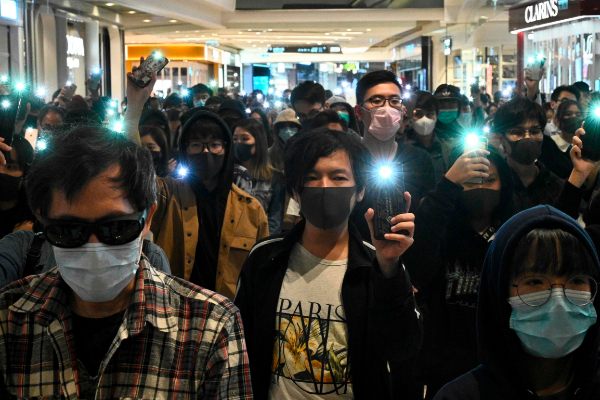- Protests: Police near protesters at the University of Hong Kong
- Asia.The mysterious blue liquid that police throws at protesters in Hong Kong
A couple of days ago, Chinese government officials began sending their contacts via WeChat - the country's main instant messaging application - a propaganda video with a rap song in English to "help see the reality of Hong Kong today in day". The song ended with a phrase that repeated: "We are all with Hong Kong. Now and forever."
In Beijing they are nervous. Never a municipal election in the former British colony had attracted so much attention. Neither from China nor from outside its borders. Although, in reality, they have no political significance. What is voted today are the district councils, the links between citizens and the local government. They cannot enact laws. The elected councilors will address community issues in the 18 districts, in each neighborhood, such as bus routes or traffic problems.
But these elections are the barometer that will show real support for protests that have been shaking the city for more than five months.
Record participation
Seven hours before the vote, 47.26% of those registered had already voted, which exceeds the total participation of 47.01% of the last elections. In fact, long lines formed in front of the polling stations throughout the city. And it is not strange considering the desire of the hongkoneses to express themselves at the polls, reports France Presse.
On one side are the candidates of the pro-government block embraced from Beijing. It is the officials, who have so far occupied most of the seats in the former colony. On the other side of the balance are pro-democratic candidates, those who ask for freedom to have complete universal suffrage and that the people can also choose the chief executive. Those who championed massive peaceful marches at the beginning of June against the bill that allowed the extradition of fugitives to mainland China that have resulted in violent protests that have left two dead.
For these elections are called to vote 4.13 million hongkoneses - of the more than seven that live in the city - in 600 polling stations armored by 31,000 police. The protesters who have taken the streets and universities these months know it, and among their Telegram groups the directive has been clear: you have to win this battle at the polls and take precautions, such as not wearing masks or black clothes, or drawing attention singing slogans, to prevent their votes and candidates from being invalidated.
Truce in street
According to the Office of Registration and Elections, of the 392,601 new registered voters, 58,794 are between 18 and 20 years old. Which shows that the youngest, who have been the ones who have burned the protests these months, will go to the polls with the hope that their candidates will surpass the pro-government to send a message to Beijing.
No less than 1,090 candidates compete for 452 seats. Around 450 are presented by pro-democratic parties. Among the favorite formations of this side are the classic Democratic Party and Civic Party. The formations on this side hope that what happened these months will boost them at the polls against other pro-Beijing parties such as the Hong Kong Alliance for Improvement and the Federation of Trade Unions, which in the last municipal elections of 2015 won 298 of the 431 seats disputed Some analysts point out, however, that the level of violence employed by protesters in recent weeks - such as setting fire to a man who reproached them for their attitude - has reduced the support of many neighbors who at the beginning of the protests supported them.
The last days have been quite calm in Hong Kong after a few weeks where clashes have taken over the media and political scene. In statements to the South China Morning Post, several kids who participated in the battle of the Polytechnic University, argued that "they have given a truce until after the elections so that the police do not carry out mass arrests so that there is less anti-government voters who go to the polls. " Since the protests began on June 9, police have arrested more than 4,000 people.
According to the criteria of The Trust Project
Know more- Hong Kong
- China
ChinaHong Kong vetoes the candidacy of activist Joshua Wong with the backing of Beijing
United Kingdom A group of protesters surrounds and beats a Hong Kong minister in London
Asia Elite forces of Chinese prisons to get Hong Kong out of 'total collapse'

